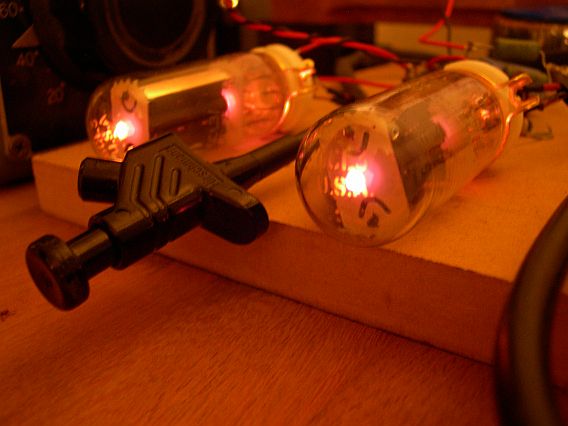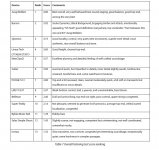Is it half a bridge?
Give them some proper base support and some damping rings and you should get even better results.
Nice one 🙂
I always liked tubes that are not on the signal path 😀
Thanks...this is still the test lay out ( I keep telling my wife this)
Full wave
Not much going on here....😀
Well I thought I'd share my tube-adventure
THEY ARE STAYING 😀
🙂
Is it half a bridge?
Give them some proper base support and some damping rings and you should get even better results.
Nice one 🙂
I always liked tubes that are not on the signal path 😀
I agree with a proper base...I have ceramique magnovals which lucky for me have a tight enough fit (despite it is slightly different)....on ebony.
I disagree with damping rings..to me they take the life out of the music...I agree that the vibrations add something...but what if you like that something 😀
It really depends on the circuit 🙂
On my Audio Research VS110 with 6550 they work wonderfully. Same on Ear834p. Same on LS25. But they were awful on the 110 reference with KT120s...
On my Audio Research VS110 with 6550 they work wonderfully. Same on Ear834p. Same on LS25. But they were awful on the 110 reference with KT120s...
I can understand the different results maybe also depending on mechanical positions of tubesockets.
My hands on experience was with ecc83, 6922, el34 tubes...no way....bad.
My hands on experience was with ecc83, 6922, el34 tubes...no way....bad.
I can understand the different results maybe also depending on mechanical positions of tubesockets.
My hands on experience was with ecc83, 6922, el34 tubes...no way....bad.
I had wonderful results on ear834p which uses ecc83, and LS25 MK1 and PH3 which use ecc88/6922. Audio Research also uses them on their newest line level stuff. I guess it s probably more tube brand or circuit related rather than tube type.
And yes position of the damper ring makes a difference. My preference was either close tot he top or both top and bottom metal spacer rings touching the glass from inside.
Last edited:
Not much going on here....😀
Well I thought I'd share my tube-adventure
THEY ARE STAYING 😀
It was achieved with the help of my audiomate to set the voltage right...that was abit of a trick.
Finally we came to know that we had to use a 50-0-50 transformer in order to get 17volt out of the tube to feed the 12 volt Dexa Super Pre Regulator who suplies the 5 volt Teddy Pardo...for the chip.
Results although all in the digital domain where pretty simular as in the analogue area...music lost a bit of its pointiness but instead came a bit warmer glow , call it musicality if you will (or if you are a a tubelover..."tubesound").

Hi Erik, would you be so kind so as to draw us a schematic of your current diode-based PSU? Including voltages and ratings, if possible?
I am really interested in trying this, but since my experience with tubes is virtually zero, I would need a paint-by-numbers sort of instruction before I would feel confident enough to attempt building it on my own.
I will soon, but at the moment we are experimenting still too much to advise....for instant we removed the resistor after the tubes which theoretically will filter ripple but tonight soundwise removal gives a (far) better result.....so resistor goes out the window and as a result of that we had to change the transformer from 50 volt to 35 volt...because of the change in voltage after tubes towards the 12 v Dexa pre regulation,....see what I mean.....😉
What we did conclude is that pre-regulation sounds better...basta.
We did every trick out of the book...including different brands of regs
and combinations....no pre regs at all or/and superregs in the pre reg...standard LM78xx ....we tried it all....costs a bit of money but worth the end results
I now use a Dexa pre regulation and a Teddy Pardo super regulation as a winning combo...after that a bybee music rail...(for the chip)
The bybee music rail needs to be studied because it strongly influences the chip and the currentdemand in combination with the Teddy Pardo which outputs 5.2 volt but after Bybee outputs 4.8 volt....straight to the chip..currentdemand from the tubes changed incredible with the bybees in ..(after regulation)..WTF...???....
Soundwise it is TO ME a pleasant upgrade so I do want the bybee music rail to stay in but howcome the currentchange is still another matter...ideas are welcome...😉
What we did conclude is that pre-regulation sounds better...basta.
We did every trick out of the book...including different brands of regs
and combinations....no pre regs at all or/and superregs in the pre reg...standard LM78xx ....we tried it all....costs a bit of money but worth the end results
I now use a Dexa pre regulation and a Teddy Pardo super regulation as a winning combo...after that a bybee music rail...(for the chip)
The bybee music rail needs to be studied because it strongly influences the chip and the currentdemand in combination with the Teddy Pardo which outputs 5.2 volt but after Bybee outputs 4.8 volt....straight to the chip..currentdemand from the tubes changed incredible with the bybees in ..(after regulation)..WTF...???....
Soundwise it is TO ME a pleasant upgrade so I do want the bybee music rail to stay in but howcome the currentchange is still another matter...ideas are welcome...😉
Last edited:
Building a power supply for the JVC EZ-based Shigaclone... I've got two Black Gate 1000uF STD caps. I can't afford an F or FK where recommended. If I use two STD would it sound better than if I used an STD where recommended and say a Mundorf 1000uF where the Black Gate F is supposed to go? Thanks for any insight. I have no experience (yet) with Black Gates.
I would use blackgates on both sides as i haven't really heard a Mundorf in these application. you can experiment with mundorf and see which ones you like best. . Blackgates here are a good option in my opinion.
I would use blackgates on both sides as i haven't really heard a Mundorf in these application. you can experiment which ones you like. Blackgates here are a good option in my opinion.
I screwed up; the second cap is a 2200uF, not a 1000. I'll be trying a Mundorf there, thanks!
Echo, try your Blackgates first, you may well like the resulting sound, depending on your personal taste and system. Two BG STD will have a bump in bass and in low treble, which makes the sound punchy, but occasionally a bit "shouty". If you have a 4.7 Black Gate N then you could try Peter Daniel's trick for taking the edge off the STD.
Having said that, I would be very interested in hearing your opinion on the MLytics. I missed them in my big capacitor test and I was often wondering how good they are.
1000uF vs 2200uF makes almost no difference, capacitor type is way more important for the sound. Higher voltage ratings seem to sound slightly better, although this may not be true for all capacitor types (it is definitely true for BG STD 1000/50V vs BG STD 1000/25).
Having said that, I would be very interested in hearing your opinion on the MLytics. I missed them in my big capacitor test and I was often wondering how good they are.
1000uF vs 2200uF makes almost no difference, capacitor type is way more important for the sound. Higher voltage ratings seem to sound slightly better, although this may not be true for all capacitor types (it is definitely true for BG STD 1000/50V vs BG STD 1000/25).
Last edited:
Since the electronics for the PiTbull Reference are coming to an end I am now figuring out how to implement them without too much chasis change....
First I am building a kind of basement floor onto the transport.
It will be made out of cocobolo and a 3 mm copper bottomplate.
The idea is that this will enable me to get as much of the delicate (extra)circuit as close to the main board as posible ..kind of 3D building. 😀
(We tested an extra 25 cm of wire between reg and chip and the sound degradation was shocking)



First I am building a kind of basement floor onto the transport.
It will be made out of cocobolo and a 3 mm copper bottomplate.
The idea is that this will enable me to get as much of the delicate (extra)circuit as close to the main board as posible ..kind of 3D building. 😀
(We tested an extra 25 cm of wire between reg and chip and the sound degradation was shocking)
Last edited:
Keep an eye on this topic of Diyaudio Super regulators this is the best that has been tested, see attachment ...
http://www.diyaudio.com/forums/diyaudio-store/247281-super-regulator.html
For questions about this Super Regulator can be asked on the Diyaudio site boards can also be ordered on the site.
Super Regulator PCB:
Super Regulator PCB - Power Supplies and Accessories - Circuit Boards
Superregs for your line-level projects:
http://www.linearaudio.nl/linearaudio.nl/images/pdf/superreg_article.pdf
Regards,
Rudy
Edit: Perhaps Tibi can test this super regulator for the Shiga 😉
http://www.diyaudio.com/forums/diyaudio-store/247281-super-regulator.html
For questions about this Super Regulator can be asked on the Diyaudio site boards can also be ordered on the site.
Super Regulator PCB:
Super Regulator PCB - Power Supplies and Accessories - Circuit Boards
Superregs for your line-level projects:
http://www.linearaudio.nl/linearaudio.nl/images/pdf/superreg_article.pdf
Regards,
Rudy
Edit: Perhaps Tibi can test this super regulator for the Shiga 😉
Attachments
Last edited:
Today my tube sockets arrived.
I actually quite like the old school look of it soft off white...matches great with the ebony and novar grip is better than the magnoval...more like a PiTbull.
(White ceramic magnoval next to it)
Lucky for me they are easily exchanged..so the ebony work was not for nothing...ready and mounted for rectification...the 6CL3 Sylvania 😉


I actually quite like the old school look of it soft off white...matches great with the ebony and novar grip is better than the magnoval...more like a PiTbull.
(White ceramic magnoval next to it)
Lucky for me they are easily exchanged..so the ebony work was not for nothing...ready and mounted for rectification...the 6CL3 Sylvania 😉
- Home
- Source & Line
- Digital Source
- Finally, an affordable CD Transport: the Shigaclone story
